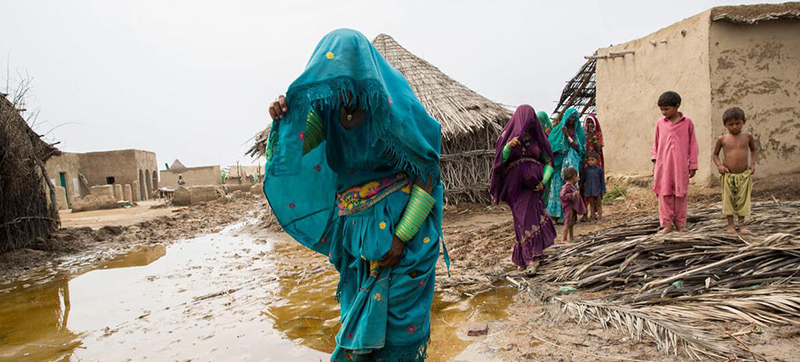 Pakistan
Pakistan New York: Major health risks are unfolding in Pakistan as unprecedented flooding continues, the World Health Organization (WHO) reported on Wednesday, warning of the threat of further spread of malaria, dengue fever and other water and vector-borne diseases.
WHO chief Tedros Adhanom Ghebreyesus said the UN agency has classified the situation as a grade 3 emergency - the highest level of its internal grading system - which means all three levels of the organization are involved in the response: the country and regional offices, as well as its headquarters in Geneva.
“Floods in Pakistan, drought and famine in the Greater Horn of Africa, and more frequent and intense cyclones in the Pacific and Caribbean all point to the urgent need for action against the existential threat of climate change,” he said, speaking during his regular briefing from WHO headquarters.
Millions affected
More than 33 million people in Pakistan, and three-quarters of all districts, have been affected by the flooding, which was brought on by monsoon rains.
At least 1,000 people have been killed and 1,500 injured, WHO said, citing national health authorities. More than 161,000 others are now in camps.
Nearly 900 health facilities across the country have been damaged, of which 180 are completely damaged. Millions have been left without access to health care and medical treatment.
The Government has declared a state of emergency, and the UN has launched a $160 million appeal for the country. Tedros also released $10 million from a WHO emergency fund to support the response.
Delivering life-saving supplies
“WHO has initiated an immediate response to treat the injured, provide life-saving supplies to health facilities, support mobile health teams, and prevent the spread of infectious diseases,” said Dr. Ahmed Al-Mandhari, Regional Director for the Eastern Mediterranean.
The UN agency and partners have conducted a preliminary assessment which revealed that the current level of devastation is much more severe than in previous floods, including those that devastated the country in 2010.
Ensuring access to services
The crisis has further aggravated disease outbreaks, including acute watery diarrhoea, dengue fever, malaria, polio, and COVID-19, particularly in camps and where water and sanitation facilities have been damaged.
Pakistan had already recorded 4,531 measles cases this year, and 15 cases of wild poliovirus, even before the heavy rainfall and flooding. A nationwide polio campaign has been disrupted in the affected areas.
“WHO is working with health authorities to respond quickly and effectively on the ground. Our key priorities now are to ensure rapid access to essential health services to the flood-affected population strengthen and expand disease surveillance, outbreak prevention and control, and ensure robust health cluster coordination,” said Dr. Palitha Mahipala, WHO Representative in Pakistan.
Flooding could worsen
With the floods projected to worsen over the coming days, WHO is immediately focused on these priorities.
Pakistan’s Government is leading the national response and is establishing control rooms and medical camps at the provincial and district level.
The authorities also are organizing air evacuation operations, and conducting health awareness sessions on waterborne and vector-borne diseases, as well as other infectious disease such as COVID-19.
WHO is working closing with the health ministry to increase surveillance for acute watery diarrhoea, cholera, and other communicable diseases to avoid further spread. The agency is also providing essential medicines and medical supplies to functional health facilities treating affected communities.
Expanding disease surveillance
Prior to the floods, WHO and partners had undertaken vaccinations against cholera in response to the pre-existing outbreak.
Pakistan is also one of the two remaining polio-endemic countries in the world, and teams in affected areas are expanding surveillance for both polio and other diseases. Furthermore, polio workers are now working closely with the authorities to support relief efforts, particularly in the worst-hit areas.
WHO has also diverted mobile medical camps to affected districts, delivered more than 1.7 million aqua tabs to ensure people have access to clean water, and provided sample collection kits for early detection of infectious diseases.
Support Our Journalism
We cannot do without you.. your contribution supports unbiased journalism
IBNS is not driven by any ism- not wokeism, not racism, not skewed secularism, not hyper right-wing or left liberal ideals, nor by any hardline religious beliefs or hyper nationalism. We want to serve you good old objective news, as they are. We do not judge or preach. We let people decide for themselves. We only try to present factual and well-sourced news.







